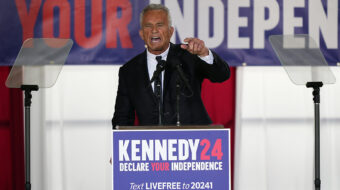Original source:
The American people worry about how their $590 billion in taxpayer money is being spent in the big bank bailout—and, on Capitol Hill today, U.S. Treasury Secretary Timothy Geithner was told why. In his first appearance before the Congressional Oversight Panel (COP), which has spent nearly six months reviewing the expenditures of the Troubled Asset Relief Program (TARP), COP chairwoman Elizabeth Warren told Geithner:
People are angry that even if they have paid their bills on time consistently and never missed a payment, their TARP-assisted banks are unilaterally raising their interest rates or slashing their credit lines….People are angry when they read headlines of record foreclosures because even if they aren’t personally facing trouble with their mortgages, they see their own property worth less and their communities declining as a result of the foreclosures all around them.
I appreciate your repeatedly stated commitment to transparency and accountability…but more remains to be done. People need to understand why you are making the choices you are making.
Warren, a Harvard law professor, asked Geithner why regulators appear to have a double standard—saying, “the banks have received 10 times more money than the auto industry yet they seem to be receiving very different treatment.” While union contracts are considered subject to change under the financing agreement, Wall Street execs walk away with billions in bonus money paid for by taxpayers.
Geithner defended the administration’s actions, saying any business or institution which requires “excessive” assistance in the future can count on tougher conditions coming down from the White House and Treasury. He hastened to add, however, that those conditions will be decided on a case-by-case basis.
Further, Geithner said regulators may want to keep banks in the program longer than the banks might wish, depending upon how much credit banks make available to borrowers.
COP deputy chairman Damon Silvers, associate general counsel for the AFL-CIO, showed Geithner charts outlining the government’s involvement in ailing Citigroup. This from The Washington Post:
So far, “the cash we put in is majority of capital of Citigroup today,” Silvers said. “Some would say we have crossed nationalization line already.”
Even with that being the case, Silvers continued, the federal government—taxpayers—only have 7.6 percent of Citigroup’s “upside” (the amount the government would get should the Citi stock rise) and exactly zero percent of voting control.
“Do you believe this is the right way to go, the model for the next sick bank?” Silvers asked.
Geithner said that, because of his job, he could not comment in detail about individual institutions, frustrating Silvers.
Silvers persisted, more bluntly: “How does protecting Citi’s common shareholders at the expense of the taxpayer benefit the economy?”
Geithner answered that Silvers cannot think about the government’s investment in and loans to private institutions in normal investment-to-profit terms. “You have to think about it through the broader prism” of whether the government intervention stabilizes the economy, he said.
In his opening statement, Silvers, who has called for regulating all global financial markets, said Treasury has taken three positive actions, including undertaking “stress tests” of the 19 largest banks, an acknowledgment that not all banks are healthy, and has demonstrated greater transparency, such as providing 10,000 documents to COP members at the request of Geithner.
He also pointed to three steps Treasury must take:
* Ensure bank management is in place that can be trusted to give an honest accounting of the state of bank balance sheets because it’s a problem for the people who made the mess to tell you how big the mess is.
* Get a realistic measure of the hole in bank balance sheets.
* Restructure bank finances, if possible, by forcing investors in the banks to bear the losses. Who bears the losses and how they are apportioned must be determined carefully, balancing systemic risk considerations with taxpayer protection.
Geithner gave a tepid endorsement of changing the bankruptcy law for distressed homeowners, saying the proposal needed to be carefully crafted to win widespread support.
Last week, the COP issued an oversight report that its two Republican members would not sign. The other panel members are: Congressman Jeb Hensarling (R-Texas); Richard Neiman, superintendent of Banks for the State of New York; and former Sen. John E. Sununu (R-N.H.). The panel’s next hearing is April 29 in Milwaukee.











Comments